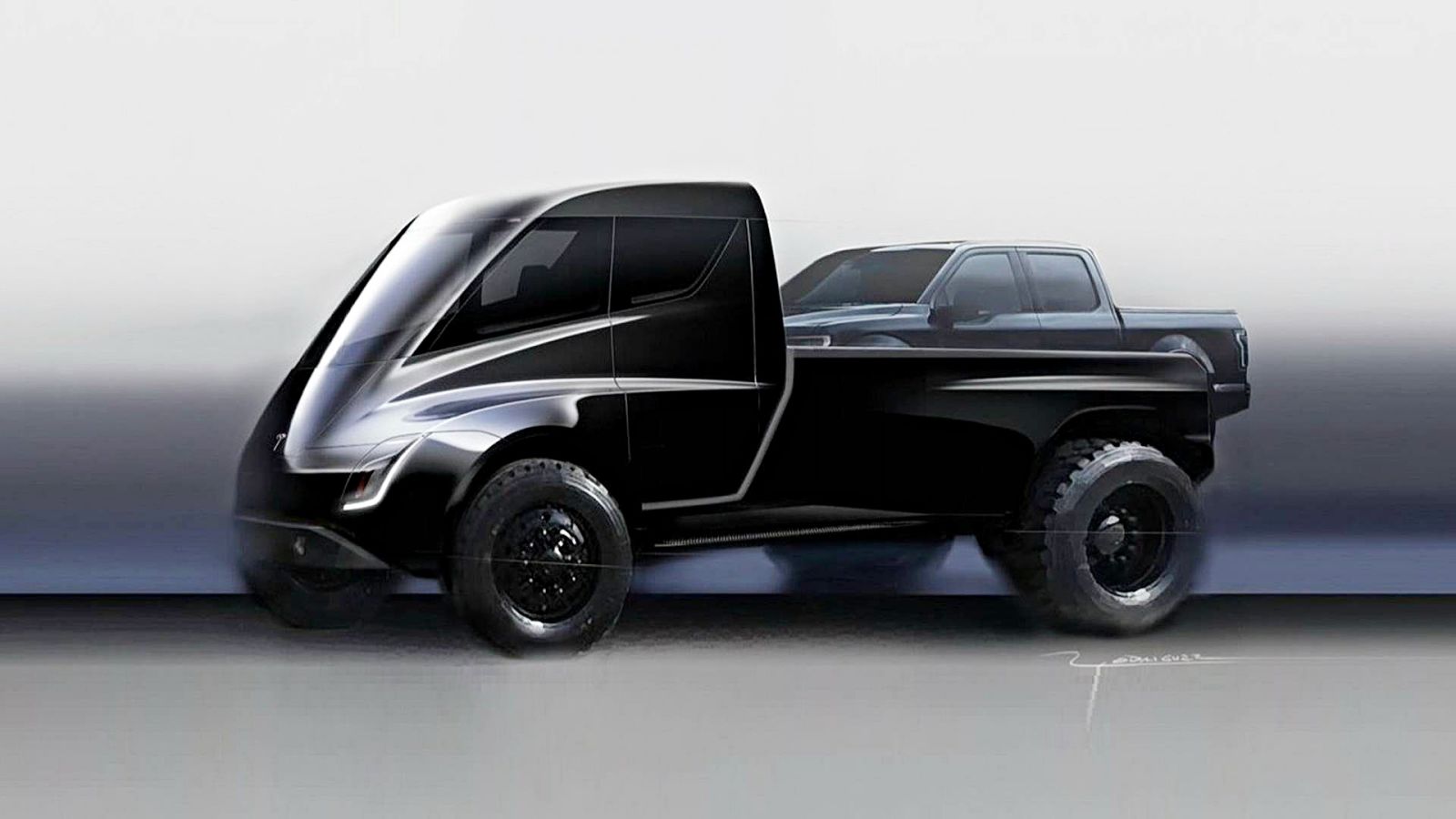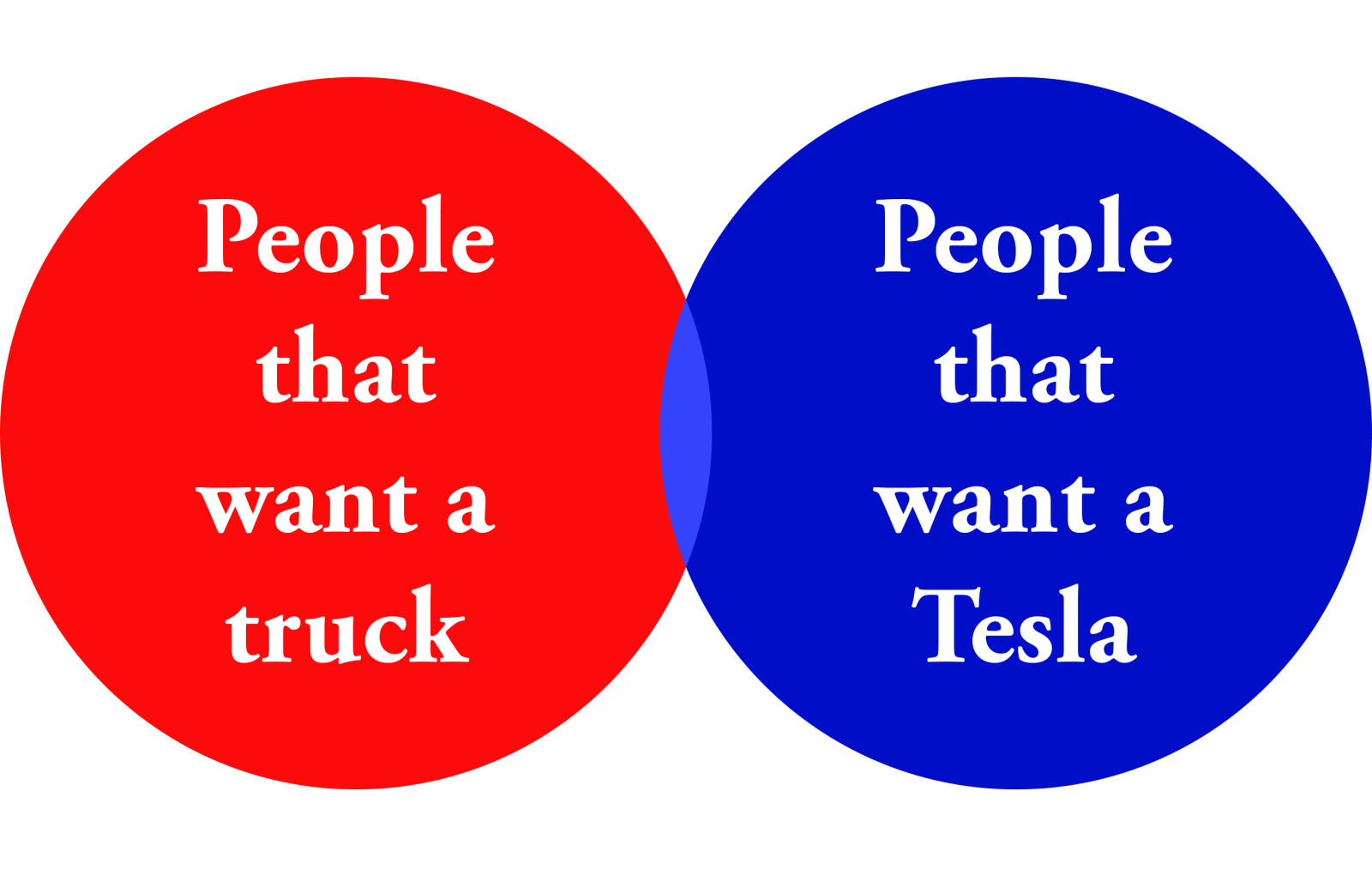
So Tesla is making a pickup truck, or so they say and while Im a curious to see what they come up with one thing I can’t say I understand is the why.
I don’t have any doubts that whatever they come up with will be a well engineered product and I think there has to be some reason that they think they should perseu this project but can someone tell me what it is?
Whos it for?
This is the one I’m having a hard time with. The Model S I get. The Model 3 I get. The Roadster I get. The Model X I...kinda get.
The way I see it there are 2 types of truck buyers
1. People that want/need utility - They tow, they haul. They do trucky things for work or for play. They may also want or need off road capability.
2. People that want a truck - look, some people just want to buy a truck for no other reason than to own a truck. There is something about a truck that calls to some people. It could be the blue jeans part of them, or their anachronistic nature or some other phycological reason...Maybe they just like modded trucks, for example.
So lets look at #1 first
What kind of utility will a Tesla truck offer?
So, numbers time, Tesla people love the numbers.
I’ll save you the math* (its at the bottom) but the moral of the story is this:
- 168-450 miles depending on towing 5000 lbs or empty with a 202 Kwh pack
- 1500 lbs payload 6500 lbs towing as a likely best case scenario
- 2.66 hours to fast charge
- $38380 in batteries alone
- 2161 lbs weight in batteries alone
Which equates to:
- Midsized payloads and towing
- terrible utility range
- long recharge times
- Huge weight and cost
To say nothing of using it as an Off Road vehicle which...come on...just because it has 4wd doesn’t mean it will be used off road. The low .cd required for these numbers as well as tire selection would prohibit it in that area.
So on to point the 2nd, people who want a truck.
This is a lot more nebulous of a concept but I think we can all agree that the people who want a truck don’t necessarily want a car shaped like a truck. The Ridgeline and its meager sales will attest to that, regardless of its trucky cred. No. People who want a truck want a look, a feel, a lifestyle.
I think we can also agree that the way Tesla will be required to make a truck will result a vehicle that doesn’t resemble this ideal, either physically or emotionally.
Which leads me to this diagram

Im not saying there aren’t people out there who wish their model X had a bed. I AM saying I think that overlap is small.
This is the part I need help with most. Can you help me understand the customer for a $85,000+ full size truck with modest payload, towing, off-road ability and virtually no “truck cred”?
Now I get that most trucks these days are daily drivers and don’t fill their beds with compost. Thats truck buyer number 1. Truck buyer number 2 wants a “truck” and I don’t think this Tesla is going to cut if for that buyer.
Now assuming Tesla can overcome cost, and engineering hurdles and build an amazing truck that changes the game...Should they build it? More accurately...
Can they build it?
They can’t build the model 3 fast enough, they’ve also committed to a roadster they haven’t even started building oh and also a Class 8 truck for commercial clients that may or may not exist.
Why is this truck even on the radar right now? Yes, I get it that truck sales are hot sauce right now, but as I said in another post...just because you are in to a market, doesn’t mean the market is into you.
How many years have Toyota and Nissan been after a slice of the full size truck market? Its not an easy game to win, let alone play in.
This is NOT chasing a market no one is in like the Model S was [luxury viable electric], or to a degree the Model X [practical utility electric]. This is a well established market that knows what it wants. Yes an electric truck is something that no one is CURRENTLY selling to consumers but it remains to be seen an electric pickup is even something consumers didn’t know they wanted. I would argue no.
Economy and running costs DO mean a lot to fleets and so there is a potential there, but purchase costs, established reputations, built out management and maintenance programs and other ancillary services I would argue mean more. This is what worries me about the Class 8 truck project as well. It remains to be seen if commercial buyers are even remotely interested in being early adopters.
So Im asking you again...who is this truck for?
*MATHS
- Musk wants a range of 400-500 miles for the truck.
- The current lardass of the range (Model X P100d) does 380 watts/mi not towing.
- The Model X P100D towing 5000 lbs at 60 mph on flat terrain consumes ~600 watt/mi, going up a hill with the same load consumes about 1kw/mi
The model X has a .cd of .24
the slipperiest pickup has a .cd ~.36 (the same claim as the Tesla Semi in its most aero form)
If Tesla was committed I think they could get their .cd down to .32 or about a 1/3rd higher than the X.
For simplicity sake lets just say that if a model X consumes 380 watts/mi the Model Truck would do about 450 for the same miles unladen, about 700 laden easy towing, and 1.2 kw laden hard towing.
the required range then would need to be
Unladen 450 miles = 202 KW.
Which would give you a towing range of between 289 miles EASY slow towing (5000 lbs) and 168 miles harder towing.
WEIGHT AND COST
Factoring in those numbers its important to look at a few more
- The current weight of batteries is 10.7 lbs/kwh
- The current cost of batteries is $190/kwh
- The current fast charge rate for the 100 kw battery pack is 1.33 hrs.
Which would mean a 202 kw battery pack would:
Weigh 2161 lbs
Cost $38,380
Take 2.66 hours to fully recharge at the fastest rate.
Now lets see how that affects the utility
The Model X p100D weighs 5500 lbs, which frankly is amazing given that a 1/5th of that is battery. Increase the size of the vehicle, double the battery size and we are talking about an EASY 6500 lb curb.
divide it by 2 (we are assuming an even weight over each axle as would be likely with such a huge battery and you are looking at 3250 per axle, or 1625 per tire. Thats before adding people, cargo, trailers, etc.
As a reference, the highest rear axle rating on the F150 (the half ton payload champ) is 4050 lbs. Thats with the solid axle the Model Truck wont have.
Remember that the truck needs to stay under 8501 lbs GVWR to be considered a light duty truck. That gives it 2000 lbs to play with but the limiting factors are going to be axle limits. 2000 lbs split up over people and cargo would mean a 30/70 front to rear split. So the rear axle would need to be able to be rated at 4650 lbs rear and 3850 up front. Thats a strong axle. Never mind that the heaviest rated tire in that category Tesla would pursue would be limited to 4600 lbs at full pressure.
No, realistically it would be in line with smaller trucks, say around 1500 lbs payload at 6500 lbs towing. Right about where the a Midsized truck would be. Likely less.